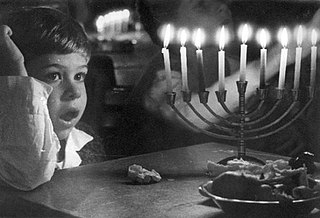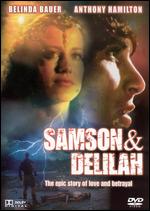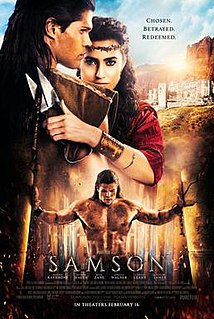
The Song of Songs, also Song of Solomon or Canticles, is one of the megillot (scrolls) found in the last section of the Tanakh, known as the Ketuvim, and a book of the Old Testament.

Zorah or Tzorah, perhaps "place of wasps," was a biblical town in the lower hill country of Judah. The site lies at an elevation of about 1,150 feet (350 m) above sea-level.

Samson was the last of the judges of the ancient Israelites mentioned in the Book of Judges in the Hebrew Bible and one of the last of the leaders who "judged" Israel before the institution of the monarchy. He is sometimes considered to be an Israelite version of the popular Near Eastern folk hero also embodied by the Sumerian Enkidu and the Greek Heracles.

Boaz is a biblical figure appearing in the Book of Ruth in the Hebrew Bible and in the genealogies of Jesus in the New Testament and also the name of a pillar in the portico of the historic Temple in Jerusalem. The word is found 24 times in the Scriptures, two being in Greek.

Hagar is a biblical person in the Book of Genesis. She was an Ancient Egyptian servant of Sarah, who gave her to Abraham to bear a child. The product of the union was Abraham's firstborn, Ishmael, the progenitor of the Ishmaelites Arabians. Various commentators have connected her to the Hagrites, perhaps claiming her as their eponymous ancestor.

Samson is a three-act oratorio by George Frideric Handel, considered one of his finest dramatic works. It is usually performed as an oratorio in concert form, but on occasions has also been staged as an opera. The well-known arias "Let the bright Seraphim" and "Total eclipse" are often performed separately in concert.

Manoah is a figure from the Book of Judges 13:1-23 and 14:2-4 of the Hebrew Bible. His name means "rest" or "peace".

Delilah is a woman mentioned in the sixteenth chapter of the Book of Judges in the Hebrew Bible. She is loved by Samson, a Nazirite who possesses great strength and serves as the final Judge of Israel. Delilah is bribed by the lords of the Philistines to discover the source of his strength. After three failed attempts at doing so, she finally goads Samson into telling her that his vigor is derived from his hair. As he sleeps, Delilah orders a servant to cut Samson's hair, thereby enabling her to turn him over to the Philistines.

Samson Agonistes is a tragic closet drama by John Milton. It appeared with the publication of Milton's Paradise Regain'd in 1671, as the title page of that volume states: "Paradise Regained / A Poem / In IV Books / To Which Is Added / Samson Agonistes". It is generally thought that Samson Agonistes was begun around the same time as Paradise Regained but was completed after the larger work, possibly very close to the date of publishing, but there is no agreement on this.

The angel of the LORD is an entity appearing repeatedly in the Tanakh on behalf of God (Yahweh).

Hazelelponi is a biblical woman mentioned in 1 Chronicles 4:3. Tzelafon was named after her.

Naso or Nasso is the 35th weekly Torah portion in the annual Jewish cycle of Torah reading and the second in the Book of Numbers. It constitutes Numbers 4:21–7:89. The parashah addresses priestly duties, camp purification, restitution for wrongs committed, the wife accused of unfaithfulness, the nazirite, the Priestly Blessing, and consecration of the Tabernacle. Naso has the largest number of letters, words, and verses of any of the 54 weekly Torah portions. The parashah is made up of 8,632 Hebrew letters, 2,264 Hebrew words, 176 verses, and 311 lines in a Torah Scroll.

Samson and Delilah is a German/Italian/American television film that was first shown on TNT in the United States. It was directed by Nicolas Roeg and broadcast December 8, 1996.

The women in the Bible are rarely mentioned by name, with named women representing only 5.5 to 8 percent of the total of all named characters, male and female. This suggests that women were not usually in the forefront of public life. Those women that are named, rose to prominence for reasons outside the ordinary. They are often an aspect of the over-turning of man-made power structures commonly found in a biblical literary device called a "reversal." Abigail and Esther, Jael who drove a tent peg into the enemy commander's temple while he slept, are a few examples of women who turned the tables on men with power. The founding matriarchs are mentioned by name, as are some prophetesses, judges, heroines, and queens, while the common woman is largely, though not completely, unseen. The slave Hagar's story is told, and the prostitute Rahab's story is also told, along with a few others like them.

Samson and Delilah is a 1984 television film adaptation of the biblical story of Samson and Delilah directed by Lee Philips and starring Max von Sydow, Belinda Bauer, Antony Hamilton, Daniel Stern and Victor Mature. Mature played Samson in the 1949 film and had a small cameo as the father of Antony Hamilton's Samson. This was his final acting role. Based on the novel Husband of Delilah by Eric Linklater, Samson and Delilah originally aired on ABC.
Samson is a 1914 American short drama film. Harold Lloyd has an uncredited role.

Dorothy Fay Hammerton, known professionally as Fay Holden, was a British-born, American-based actress. She was known as Gaby Fay early in her career.
A type scene is a literary convention employed by a narrator across a set of scenes, or related to scenes already familiar to the audience. The similarities with, and differences from, the established type are used to illuminate developments in plot and character. Robert Louis Fowler wrote, "The technique of the type-scene offers the poet a basic scaffolding, but it also allows the poet to adapt each scene for specific purposes."
Jo Cheryl Exum is a feminist biblical scholar. She is currently Emeritus Professor at the University of Sheffield.

Samson is a 2018 Biblical drama film directed by Bruce Macdonald and inspired by the story of Samson in the Book of Judges. The film stars Taylor James as Samson, along with Jackson Rathbone, Billy Zane, Caitlin Leahy, Rutger Hauer, and Lindsay Wagner. The film was released in the United States on February 16, 2018. It was negatively reviewed by film critics and was a box office bomb.


















